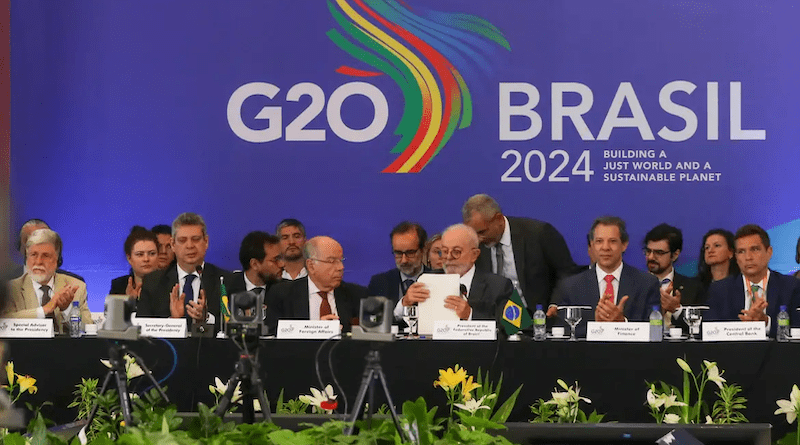At Helm Of G20, Brazil’s President Lula Pledges To Reduce Global Inequality
By ABr
By Andreia Verdélio
Presiding over the G20, Brazilian President Luiz Inácio Lula da Silva advocated Wednesday (Dec. 13) the creation of international tax mechanisms to help finance sustainable development and reduce the inequality among nations. The motto of the Brazilian presidency is “Building a just world and a sustainable planet.”

“Some 70 countries, many of them in Africa, are either insolvent or close to insolvency. Nearly half of the world’s population, 3.3 billion people, live in countries that allocate more resources to debt service payments than to education or health care,” he noted.
As president of the group that brings together the world’s largest economies, President Lula said he intends to encourage international financial institutions to cut surcharges, increase the volume of concessional resources, and devise formulas to reduce risks. “We need a more equitable regime for allocating special rights to withdraw money. Today, those who need it the most receive the least, which exacerbates inequalities among countries,” he added.
In Brasília, the leader took part in the joint meeting of the tracks for Finance and Sherpas (personal emissaries of G20 leaders, who oversee negotiations) of the bloc, which Brazil has been chairing since December 1, 2023, and will chair until November 30, 2024.
One of the priorities of the Brazilian mandate is the defense of the reform of global governance and financing institutions aimed at reflecting present geopolitics. President Lula has argued that the current governance model, created after the Second World War, is anachronistic and no longer represents 21st century dynamics. In his view, there needs to be adequate representation of emerging countries in bodies such as the United Nations Security Council and in financing institutions such as the World Bank and the International Monetary Fund (IMF).
Sustainable development
Brazil’s second priority at the helm of the G20 is tackling climate change with a focus on the energy transition, as well as the promotion of sustainable development in its economic, social, and environmental dimensions. In his opinion, the changes the world is going through should result in social well-being, economic prosperity, and environmental sustainability for all.
The president explained that the G20 accounts for three quarters of the world’s greenhouse gas emissions, adding that high-income group members emit 12 tons of carbon dioxide per capita every year, while middle-income members emit half that amount. In this sense, President Lula argued, the de-carbonization of the global economy and the digital revolution are vital, but they must be fair.
“Access to technology is fundamental not only for a just energy transition, but also in the digital field. We want to expand capacities in areas such as artificial intelligence, computing infrastructure included. Clear and collectively agreed guidelines will be needed in the use of this tool. In dealing with artificial intelligence, the world cannot repeat the division between responsible and irresponsible countries that once marked discussions on disarmament and non-proliferation,” the Brazilian leader declared.
Brazil’s work ahead of the group should include an initiative for bioeconomy and a task force against climate change. The focus of the task force, the president said, will be to promote national plans for ecological transformation, taking into account the impact of global warming on the most vulnerable.
Bioeconomy, on the other hand, is a “promising avenue” for a number of developing countries. “We need to define basic principles on the sustainable use of natural resources, in order to create goods and services with high added value,” he stated.
Fighting hunger
The third and final priority in the Brazilian mandate is social inclusion and the fight against inequality, hunger, and poverty. Brazil will also create a task force against hunger, with the proposal of a global alliance based on three pillars: national commitments, to promote public policies with proven effectiveness; finances, which should mobilize internal and external resources to finance these policies; and technical support, disseminating good practices and encouraging international cooperation in the Global South.
“We want to eradicate one of today’s main scourges. It is unacceptable that a world capable of generating wealth to the tune of $100 trillion a year should live with hunger assailing more than 735 million people and poverty plaguing over eight percent of the population,” he argued.
During his speech, the president said the world has been marked by “an upsurge in conflicts, growing fragmentation, the formation of protectionist blocs, and environmental destruction.” He mentioned the conflict between Israel and Palestine and said that Brazil “is still mourning.”
Agenda
Brasília is hosting the first meetings this week. Yesterday (12) saw the end of the meeting of the sherpas, who discuss the items that make up the summit’s agenda and spearhead most of the work. Tomorrow and Friday will see the start of the Finance Track meeting, which gathers deputy finance ministers and vice-presidents of G20 central banks.
Brazil has been proposing a rapprochement between these two bodies, so they can work in a more coordinated way. This is why the two tracks met today (13).
“There have been many declarations, notes, and reports adopted in recent years. But decisions do not always come to fruition. Synergy between the political and financial tracks making up the G20 will be essential in ensuring that the group operates successfully,” he said at the opening of the meeting.

